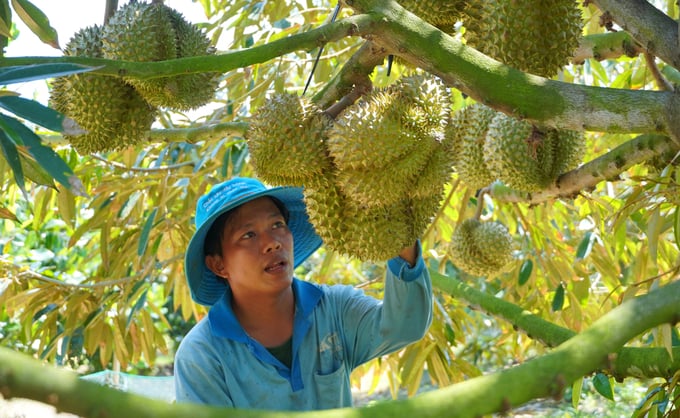June 18, 2025 | 04:44 GMT +7
June 18, 2025 | 04:44 GMT +7
Hotline: 0913.378.918
June 18, 2025 | 04:44 GMT +7
Hotline: 0913.378.918

Durian at a garden in Long An. Photo: Hoang Nam.
Vietnam's total fruit and vegetable export turnover in 11 months exceeded USD 6.6 billion. China accounted for 65% of the market share, followed by the US, South Korea, Thailand, and Japan.
According to the Vietnam Fruit and Vegetable Association, durian is a key export item, accounting for about 42% of the total fruit and vegetable export turnover to China and reaching about USD 2.8 billion in 11 months. Vietnam is currently China's second largest durian supplier, with its market share increasing from 34% in 2023 to more than 40% this year, creating significant competitive pressure for Thailand and other Southeast Asian countries.
Fruits such as dragon fruit, bananas, jackfruit, and mangoes also contribute significantly to export turnover. In particular, bananas and jackfruit are leading the market share in this country. Vietnam's banana market share increased from 31.3% in 2023 to 40.7% this year - an impressive result. By the end of 2024, banana export turnover is expected to reach half a USD billion - a record high.
This strong growth comes from many factors, such as stable product quality, flexible pricing strategy, and geographical advantages that make Vietnam's logistics costs more competitive than other countries. In addition, Vietnamese enterprises have made efforts to meet strict quarantine standards from China, improving access to this market.
Despite achieving positive results, Vietnam still faces fierce competition. Thailand is promoting quality control, improving new durian varieties, and taking advantage of the China-Laos railway to reduce transportation costs and improve competitiveness. Therefore, Vietnamese enterprises must have good strategies and directions to compete with strong competitors.
In 2024, Vietnam signed two necessary protocols with China. The first is the Protocol on frozen durian, helping to expand the export of processed products such as durian pulp and pureed durian, adding value to the product. The second is the Protocol on Fresh Coconuts, with an expected export turnover of over USD 1 billion, opening up great opportunities for coconut-growing regions, especially in the Mekong Delta.
According to the Import-Export Department (Ministry of Industry and Trade), these agreements not only expand the market but also increase the export turnover of fruits and vegetables in 2024 to about USD 7.2 billion. The outlook for 2025 is also very favorable, as many types of Vietnamese fruits continue to be licensed for export to potential markets worldwide.
Translated by Huong Giang
/2025/06/17/2344-1-131758_261.jpg)
(VAN) Amid tariff risks and growing trade barriers in the U.S. market, Australia is emerging as a promising destination to sustain the growth momentum of Vietnam's shrimp exports.
/2025/06/17/2013-1-nongnghiep-112009.jpg)
(VAN) This notable growth trend reflects the global taste for fresh, nutritious fruits and the expanding use of lychees across various sectors.

(VAN) The political and cultural insulation of Japan’s beloved grain is falling apart, and experts warn the country’s relationship with the staple will have to adapt.

(VAN) Noting risks, report examines impacts of avian influenza, changing trade patterns since 2022, fish fraud, and shipping industry’s net-zero goals.

(VAN) Mr. Tran Quang Bao, General Director of the Forestry and Forest Protection Department, met and worked with the International Wood Products Association to promote cooperation in the field of timber trade.

(VAN) China's outbound shipments of rare earths in May jumped 23% on the month to their highest in a year, though Beijing's export curbs on some of the critical minerals halted some overseas sales.

(VAN) To sustain capital flow, administrative reform alone is not enough; what farmers truly need is an ecosystem where both government and businesses grow together in support.